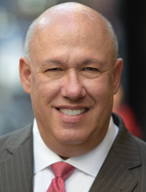Social Media 2.0: Transitioning From Law Student to Professional
9.9.2024

The transition from student to professional is more than the job search and upgrading your wardrobe. A recent event sponsored by the Young Lawyers Section tackled the issue of reforming the use of social media for the newly licensed attorney. The event featured past NYSBA section chairs Mark Berman and Kim Wolf Price. Together they offered practical advice on what to do and how to avoid common mistakes new lawyers can make on social media.
Students are advised to scrub their personal platforms of embarrassing photos from college parties or road trips. Wolf Price, a former assistant law school dean, takes that a step further. She advises students to create a new LinkedIn page with a professional headshot and remove any images that look too casual on your profile. Focus on connecting with legal professionals and friends who may be rising in other fields after college. Berman added that posting on LinkedIn is a part of his schedule that has increased his visibility.
“I make it my practice to do a LinkedIn post every two weeks,” he said. “People who would have never contacted me by phone or email see my LinkedIn post and write to me directly. It’s a different way of communicating and people like it.”
Both attorneys caution new lawyers to read every article before sharing them while keeping their LinkedIn posts relevant to the work they are doing. Avoid any discriminatory or offensive language, because those actions reflect on your clients and your employer.
“We all come to the table with implicit biases,” said Wolf Price. “Make sure that you are being professional and continually educating yourself on those topics to protect your reputation and professional identity.”
Ethics Are Everywhere
You are governed by a strict code of ethics as an attorney. Wolf Price reminded the new lawyers that this includes your personal life.
“If you post something on a personal platform that can be thought of as violating any of the ethics rules, including being discriminatory, you can face a lot of difficulty within the profession,” she said. “Use discretion when sharing personal or confidential information including your location. You might do a check in on Instagram, but if people know you are traveling for work, you could be offering information that we don’t want to give away. Use caution and when in doubt, don’t post,” she warned.
The issue of confidentiality arises when facing a poor public review or inaccurate comments following a case. Both Berman and Wolf Price caution new lawyers to resist the temptation to fight back online.
“If someone beats you up on social media, your comment in public is: ‘I disagree with what you’ve said, but due to my ethics, I’m precluded from responding to you publicly over social media. Please contact me privately, and we can discuss why you’re wrong,’ said Berman. “You have not revealed any client confidences or information, and you have pulled your punch. You will be held to an ethical violation if you respond in kind.”
Berman, who focuses on commercial litigation as well as technology in his practice, says it’s imperative to understand copyright laws, privacy rules and the social media policies of your employer. You want the use of social media should enhance your career not hinder it.
“Beware of posting anything that might come off as attorney advertising,” he said. “It’s best to add an attorney advertising disclaimer. There is no downside risk to adding the disclaimer and you can avoid getting a complaint.”
Cybersecurity and Protecting Client Privacy
The role of cybersecurity and protecting your client’s right to privacy are heightened when using public facing platforms. As a practical matter, Berman shared that he does not use public Wi-Fi in hotels, on Amtrak or during air travel, instead opting for a hotspot run off his phone.
“You don’t know who the voyeur is looking for information at that hotel,” he said. “The hotspot may be slower, but it’s safer in maintaining client confidentiality.”
Berman also shared that he does not download apps on his phone which may gain access to your contacts.
“As a lawyer, I have confidential client information on my phone that might include their social security number,” he said. “If that platform gets confidential client information, that’s a breach of your ethics. They may take it, sell it or misuse it.”
The two presenters concluded the program encouraging new lawyers to continue their NYSBA membership and make use of resources available including the association’s Social Media Guidelines for Attorneys.
Social media can be a great tool for connecting with people, research and career advancement. Wolf Price said the time to start curating that vision is now. “Present yourself in your best light. Be intentional, don’t respond quickly. Understand that you have more on the line now than ever before.”








